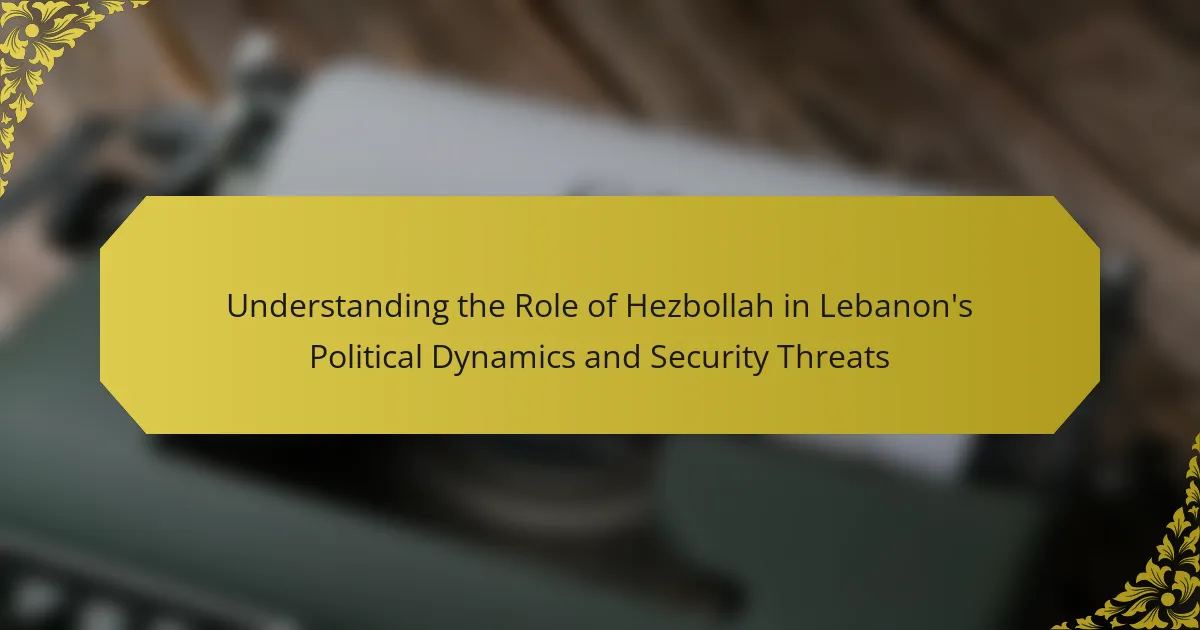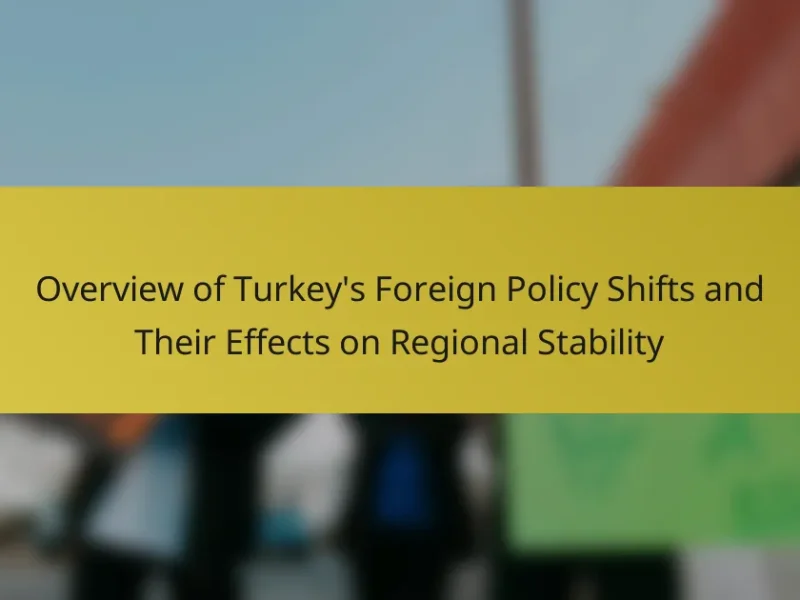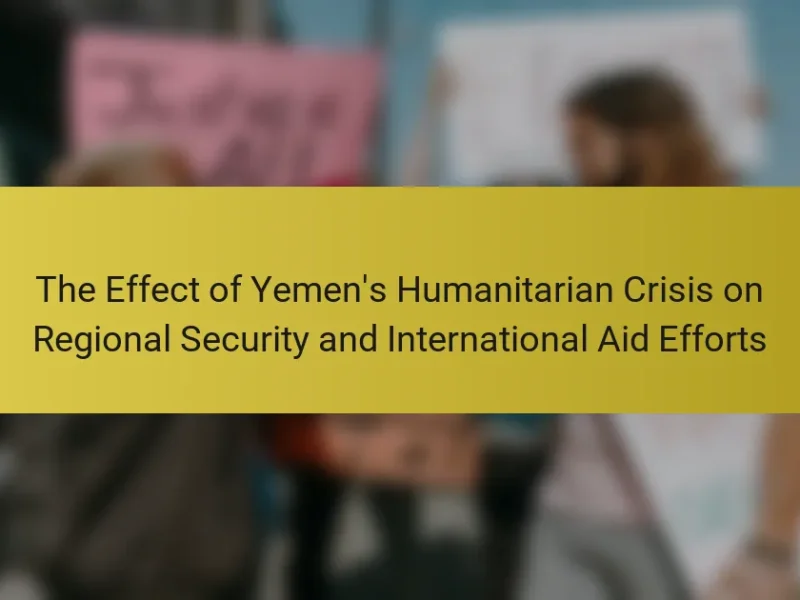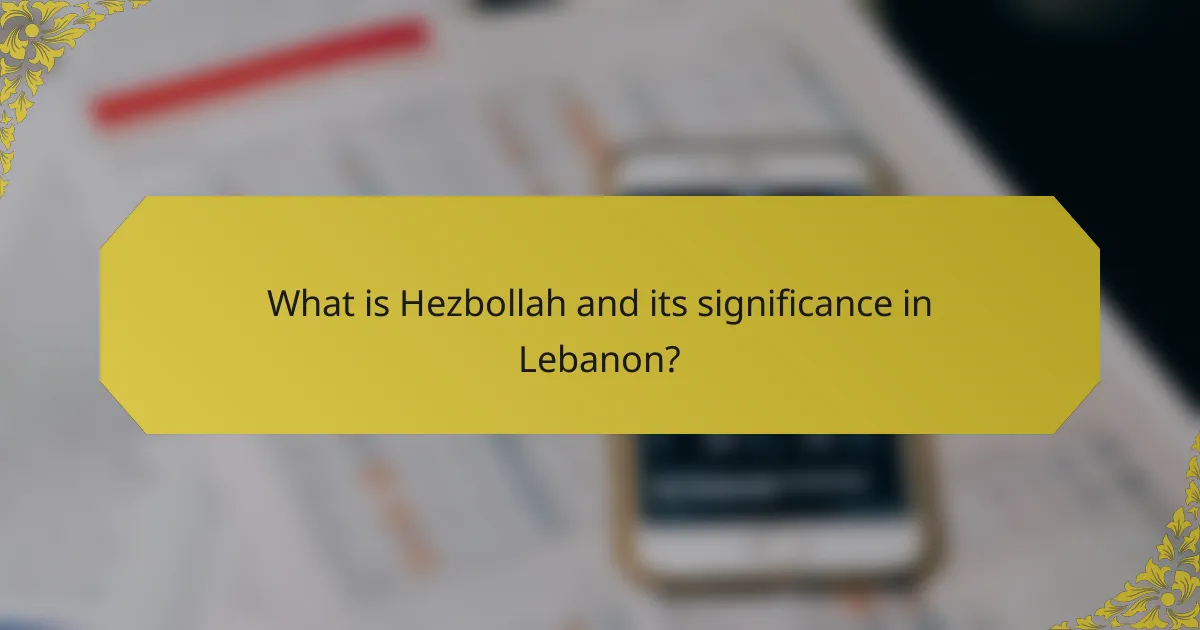
What is Hezbollah and its significance in Lebanon?
Hezbollah is a Shiite political and militant group based in Lebanon. It was founded in the early 1980s during the Lebanese Civil War. Hezbollah emerged in response to the Israeli invasion of Lebanon in 1982. The group aims to resist Israeli influence and promote Shiite political power in Lebanon.
Hezbollah holds significant political influence in Lebanon. It has representation in the Lebanese Parliament and has participated in government coalitions. The group also provides social services, such as education and healthcare, to its supporters.
Hezbollah’s military wing is considered a key player in regional conflicts. It has engaged in several confrontations with Israel, notably the 2006 Lebanon War. The group is also involved in the Syrian Civil War, supporting the Assad regime.
Internationally, Hezbollah is designated as a terrorist organization by several countries, including the United States and Israel. Its activities and alliances impact Lebanon’s security landscape and regional stability.
How did Hezbollah emerge in the context of Lebanese politics?
Hezbollah emerged in the context of Lebanese politics during the early 1980s. It was formed as a response to the Israeli invasion of Lebanon in 1982. The group was influenced by the Iranian Revolution of 1979 and sought to establish an Islamic state in Lebanon. Hezbollah gained support from Shia communities, who felt marginalized in a predominantly Christian and Sunni political landscape. The organization combined military resistance against Israel with social services for Shia populations. Over time, it became a significant political force, participating in Lebanese elections and holding seats in parliament. Hezbollah’s military wing was recognized for its role in the 2006 conflict with Israel, further solidifying its influence in Lebanese politics.
What historical events contributed to the formation of Hezbollah?
Hezbollah was formed in response to the 1982 Israeli invasion of Lebanon. This invasion aimed to eradicate the Palestine Liberation Organization (PLO) presence in Lebanon. The invasion led to significant civilian casualties and destruction. Many Lebanese Shia Muslims felt marginalized and vulnerable during this period. The Iranian Revolution in 1979 also inspired Shia activism in Lebanon. Iranian support facilitated the establishment of Hezbollah. The group was initially formed by a coalition of Shia clerics and militants. Hezbollah’s formation was further influenced by the Lebanese Civil War, which lasted from 1975 to 1990. These historical events created a context for Hezbollah’s emergence as a political and military force in Lebanon.
How has Hezbollah’s ideology shaped its role in Lebanon?
Hezbollah’s ideology has significantly shaped its role in Lebanon by intertwining religious beliefs with political and military objectives. This ideology is rooted in Shia [censured] and emphasizes resistance against perceived oppression, particularly from Israel and Western influences. Hezbollah positions itself as a defender of Lebanon’s sovereignty, gaining popular support among the Shia community. The organization’s narrative portrays its military actions as a legitimate response to aggression, which has solidified its status as a key player in Lebanese politics. Additionally, Hezbollah’s social services and welfare programs have fostered loyalty among its constituents. The group’s ideology also promotes a vision of an Islamic state, influencing its political alliances and opposition strategies. This dual role of military resistance and political participation has made Hezbollah a dominant force in Lebanon’s complex political landscape.
What are the key functions of Hezbollah within Lebanon’s political landscape?
Hezbollah plays multiple key functions within Lebanon’s political landscape. It operates as a political party with significant representation in the Lebanese parliament. Hezbollah also provides social services, including education and healthcare, to its constituents. The group maintains an armed wing, which it claims is necessary for resistance against Israel. Hezbollah’s military capabilities influence Lebanon’s security dynamics and deter external threats. Additionally, it has established alliances with other political factions, shaping government policies. The organization receives support from Iran, which bolsters its political and military strength. Its involvement in regional conflicts further complicates Lebanon’s internal politics. These functions collectively position Hezbollah as a major player in Lebanon’s governance and security.
How does Hezbollah influence governmental decisions and policies?
Hezbollah influences governmental decisions and policies through political representation and armed power. It holds significant seats in the Lebanese Parliament, allowing it to shape legislation. The group also exerts pressure on the government through its military capabilities. Hezbollah’s support is crucial for various political coalitions. This support can sway critical decisions, especially regarding security and foreign relations. The organization’s influence is evident in its opposition to certain international agreements. It also affects domestic policies, particularly those related to social services and infrastructure. Hezbollah’s ability to mobilize public support further strengthens its position in governmental matters.
What role does Hezbollah play in shaping public opinion in Lebanon?
Hezbollah plays a significant role in shaping public opinion in Lebanon through its extensive media presence and grassroots mobilization efforts. The organization utilizes television, radio, and social media to disseminate its narrative. Hezbollah’s media channels, such as Al-Manar, promote its political agenda and counter opposing viewpoints. The group also engages in community outreach, providing social services that enhance its image among the public.
Additionally, Hezbollah’s military actions and political stances are framed as resistance against external threats, especially Israel. This framing resonates with many Lebanese who view Hezbollah as a protector of national sovereignty. Polls indicate that a substantial portion of the Lebanese population supports Hezbollah, influenced by its portrayal of social justice and resistance.
The group’s ability to influence public sentiment is further bolstered by its role in the Lebanese political system, where it holds significant parliamentary representation. This political presence allows Hezbollah to shape legislative discussions and national policies, reinforcing its narrative.
In summary, Hezbollah’s media influence, community engagement, and political involvement contribute to its substantial impact on public opinion in Lebanon.
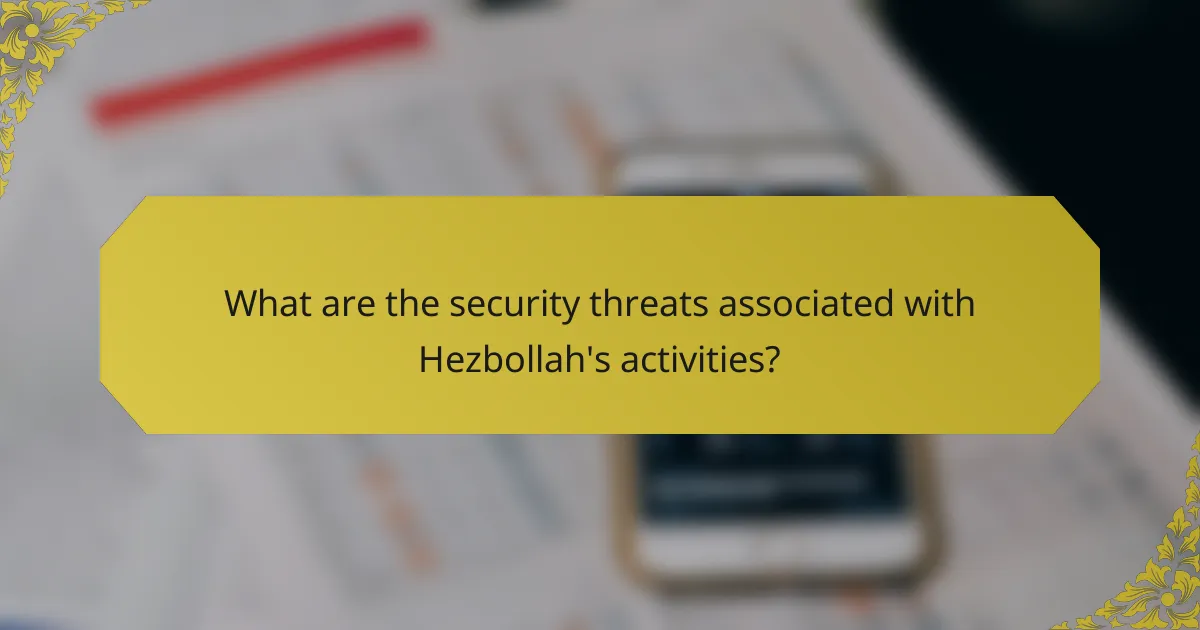
What are the security threats associated with Hezbollah’s activities?
Hezbollah’s activities pose several security threats. These include regional instability, as Hezbollah engages in military confrontations with Israel. The group has been involved in various conflicts, including the 2006 Lebanon War. Hezbollah’s military capabilities, including advanced weaponry, threaten both Lebanese sovereignty and regional peace. Additionally, Hezbollah’s involvement in the Syrian civil war has exacerbated sectarian tensions. The group’s alliances with Iran and other militant organizations further complicate the security landscape. Hezbollah’s influence in Lebanese politics can undermine state authority and governance. The potential for terrorist attacks against civilian targets adds to the security risks. Overall, Hezbollah’s multifaceted activities create a complex security environment in Lebanon and the broader region.
How does Hezbollah’s military capability impact regional security?
Hezbollah’s military capability significantly impacts regional security by enhancing its deterrence against adversaries. This group possesses advanced weaponry, including missiles and drones. Its military strength allows Hezbollah to project power beyond Lebanon’s borders. The presence of Hezbollah complicates military strategies of Israel and other regional states. Additionally, Hezbollah’s involvement in conflicts, such as in Syria, affects the balance of power in the region. The group’s alliances with Iran and Syria further bolster its military capabilities. This, in turn, raises concerns for neighboring countries regarding potential escalations. Overall, Hezbollah’s military capability serves as a critical factor in shaping the security landscape of the Middle East.
What are the implications of Hezbollah’s arms stockpile for Lebanon’s stability?
Hezbollah’s arms stockpile significantly threatens Lebanon’s stability. This stockpile enhances Hezbollah’s military capabilities, allowing it to operate independently of the Lebanese state. The presence of these weapons can deter state authority and challenge government control. It also fuels internal divisions among various political factions in Lebanon. Increased tensions may lead to escalated violence or conflict. Additionally, Hezbollah’s arms can provoke external military responses, destabilizing the region further. The situation complicates Lebanon’s relationships with international actors, particularly Western nations. Overall, Hezbollah’s arsenal poses a direct challenge to national sovereignty and peace in Lebanon.
How does Hezbollah’s involvement in regional conflicts affect Lebanon?
Hezbollah’s involvement in regional conflicts significantly impacts Lebanon’s political stability and security. The group’s military engagements, particularly in Syria, have polarized Lebanese society. This polarization often leads to increased sectarian tensions among the diverse religious communities in Lebanon. Additionally, Hezbollah’s actions can provoke retaliatory attacks from Israel, threatening national security. The group’s role in regional conflicts also complicates Lebanon’s relations with other countries. For instance, its alignment with Iran and opposition to Western interests can lead to economic sanctions. Furthermore, Hezbollah’s military capabilities challenge the authority of the Lebanese state, undermining its sovereignty. Overall, the group’s regional activities create a complex web of challenges for Lebanon’s governance and security landscape.
What are the international responses to Hezbollah’s actions?
International responses to Hezbollah’s actions vary significantly among countries and organizations. Many Western nations, including the United States, designate Hezbollah as a terrorist organization. They impose sanctions aimed at crippling its financial networks. The U.S. has also provided military aid to Israel to counter Hezbollah’s influence.
Conversely, some countries, like Iran and Syria, support Hezbollah politically and militarily. They view Hezbollah as a legitimate resistance movement against Israel. The European Union takes a more nuanced approach, recognizing Hezbollah’s political role in Lebanon while still labeling its military wing as a terrorist organization.
International organizations, such as the United Nations, often call for dialogue and restraint. They emphasize the need for stability in Lebanon and the region. Responses are shaped by geopolitical interests, regional alliances, and ongoing conflicts.
How have foreign governments reacted to Hezbollah’s influence?
Foreign governments have reacted to Hezbollah’s influence with a mix of condemnation and support. The United States has designated Hezbollah as a terrorist organization since 1997. This designation has led to sanctions against the group and its affiliates. European nations have varied in their responses. Some, like the UK, have also classified Hezbollah’s military wing as a terrorist entity. Others, such as France, maintain dialogue with Hezbollah, recognizing its political role in Lebanon. Regional powers like Saudi Arabia oppose Hezbollah, viewing it as an Iranian proxy threatening their interests. Conversely, Iran supports Hezbollah, providing it with military and financial assistance. This complex web of reactions illustrates the geopolitical stakes surrounding Hezbollah’s influence in Lebanon and the broader Middle East.
What role do international sanctions play in addressing Hezbollah’s activities?
International sanctions aim to limit Hezbollah’s funding and resources. They target the group’s financial networks and key individuals. Sanctions restrict access to international banking systems. They also hinder Hezbollah’s ability to engage in global trade. The United States and European Union have implemented these measures. For example, the U.S. designated Hezbollah as a terrorist organization in 1997. This designation allows for asset freezes and travel bans. Sanctions can weaken Hezbollah’s operational capabilities. They also signal international disapproval of the group’s actions. Overall, sanctions play a critical role in countering Hezbollah’s influence in Lebanon and the region.
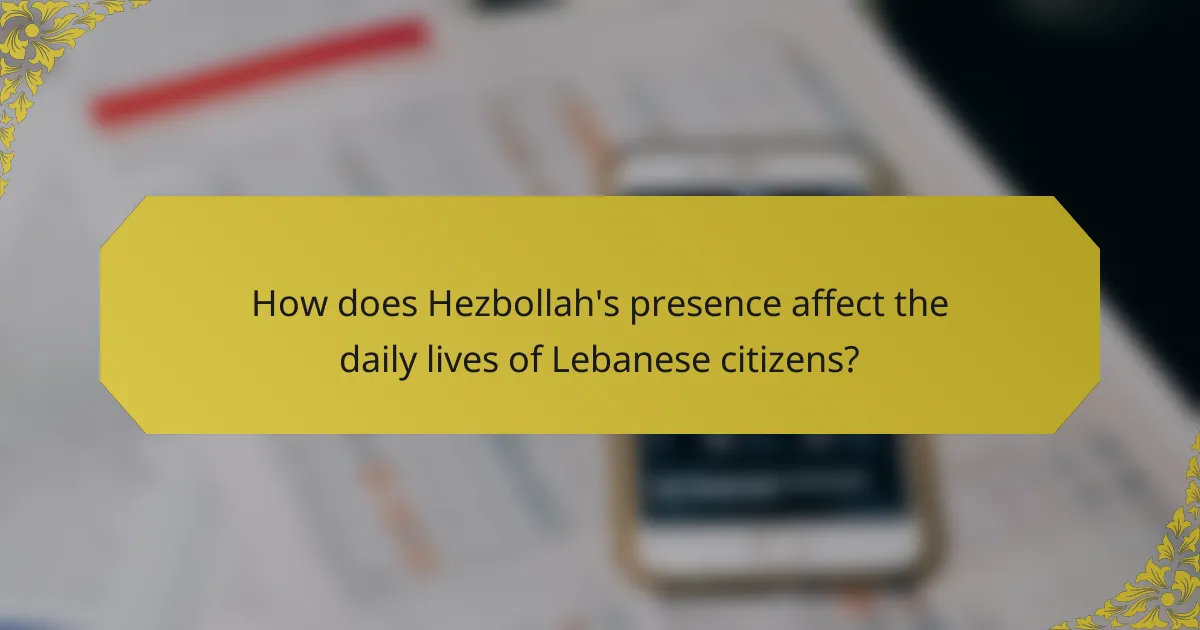
How does Hezbollah’s presence affect the daily lives of Lebanese citizens?
Hezbollah’s presence significantly influences the daily lives of Lebanese citizens. It affects security, political stability, and social services. Many citizens rely on Hezbollah for protection in areas where the state is perceived as weak. The group provides social services, including healthcare and education, filling gaps left by the government. This creates a dependency among some communities on Hezbollah’s support. However, its military activities can also lead to instability and conflict, impacting civilian safety. Economic conditions are often strained due to the group’s involvement in regional conflicts. Overall, Hezbollah’s dual role as a provider and a militant group shapes the complexities of daily life in Lebanon.
What are the social services provided by Hezbollah in Lebanon?
Hezbollah provides various social services in Lebanon, including healthcare, education, and welfare assistance. They operate hospitals and clinics, offering medical care to underserved populations. Hezbollah runs schools and vocational training programs, focusing on education for children and youth. They also provide financial support to families in need, helping with basic living expenses. Their social services are aimed at strengthening community ties and enhancing their political influence. These services are often more accessible than those provided by the state. Hezbollah’s social programs have contributed to their popularity in certain regions of Lebanon.
How does Hezbollah’s provision of services impact its popularity?
Hezbollah’s provision of services significantly enhances its popularity among its constituents. The organization offers social services, including healthcare, education, and welfare, which fill gaps left by the Lebanese government. These services are often perceived as more effective and accessible than those provided by state institutions.
As a result, Hezbollah builds a loyal support base that appreciates its contributions to community welfare. Surveys indicate that many Lebanese view Hezbollah as a critical provider of essential services. Furthermore, the group’s ability to deliver aid during crises, such as during the 2006 Lebanon War, reinforces its image as a reliable entity. Consequently, this service provision leads to increased political support and legitimizes its role in Lebanese society.
What challenges do citizens face due to Hezbollah’s political and military activities?
Citizens face significant challenges due to Hezbollah’s political and military activities. These challenges include increased violence and instability in their communities. Military confrontations often lead to civilian casualties and destruction of property. Additionally, Hezbollah’s actions can provoke retaliation from other nations or groups. This creates an environment of fear and uncertainty for residents. Citizens also experience economic repercussions due to sanctions imposed on Lebanon linked to Hezbollah’s activities. Access to basic services may be compromised as resources are diverted to military efforts. Furthermore, political polarization in Lebanon often escalates tensions among different sectarian groups. This can hinder effective governance and public service delivery.
What strategies can Lebanon adopt to address the challenges posed by Hezbollah?
Lebanon can adopt a multifaceted strategy to address the challenges posed by Hezbollah. Strengthening the Lebanese Armed Forces (LAF) is essential. Increased funding and training for the LAF can enhance its capability to maintain security. Promoting national dialogue among political factions can foster unity against external threats. Engaging international partners for diplomatic support is also crucial. Economic development initiatives can reduce Hezbollah’s influence by providing alternatives to its social services. Addressing corruption within the government can improve public trust and governance. Implementing disarmament initiatives can gradually reduce Hezbollah’s military capabilities. These strategies, when combined, can create a more stable and secure Lebanon.
How can Lebanon strengthen its political institutions to mitigate Hezbollah’s influence?
Lebanon can strengthen its political institutions by promoting transparency and accountability. Establishing independent judicial bodies can ensure fair governance. Strengthening electoral laws will enhance democratic processes. Encouraging civil society participation can empower citizens to engage politically. Reducing sectarianism in politics will foster unity among diverse groups. Enhancing security forces’ professionalism can reduce reliance on militias like Hezbollah. Supporting economic reforms can diminish Hezbollah’s social influence through poverty alleviation. International partnerships can provide resources and expertise for institutional development.
What role does civil society play in confronting Hezbollah’s power?
Civil society plays a critical role in confronting Hezbollah’s power by promoting political accountability and advocating for democratic governance. Civil society organizations mobilize citizens to demand transparency from the government. They also provide platforms for dialogue and debate about Hezbollah’s influence in Lebanon. Through grassroots activism, civil society can challenge Hezbollah’s narratives and policies. This engagement fosters a more informed public that can resist Hezbollah’s dominance. Additionally, civil society groups often work to document human rights abuses linked to Hezbollah. They raise awareness about the impact of Hezbollah’s actions on Lebanese society. By doing so, they contribute to a broader resistance against Hezbollah’s political and military power.
What practical steps can citizens take to navigate the complexities of Hezbollah’s role?
Citizens can navigate the complexities of Hezbollah’s role by staying informed about regional politics. They should follow credible news sources that cover Lebanese affairs. Engaging in community discussions can provide diverse perspectives. Attending public forums and debates enhances understanding of Hezbollah’s influence. Building networks with NGOs can offer insights into security issues. Participating in civic education programs can empower citizens to act. Understanding the legal framework governing Hezbollah’s actions is crucial. Finally, advocating for dialogue and peaceful resolutions can contribute to stability.
Hezbollah is a Shiite political and militant group in Lebanon, founded in the early 1980s in response to the Israeli invasion. The organization plays a significant role in Lebanese politics, holding parliamentary seats and providing social services while maintaining a military wing that engages in regional conflicts. This article explores Hezbollah’s emergence, ideology, and influence on governmental decisions, public opinion, and security threats in Lebanon, as well as its impact on the daily lives of citizens and the international responses to its activities. The complexities of Hezbollah’s dual role as a provider of social services and a militant group contribute to the challenges faced by Lebanon’s political landscape and stability.
